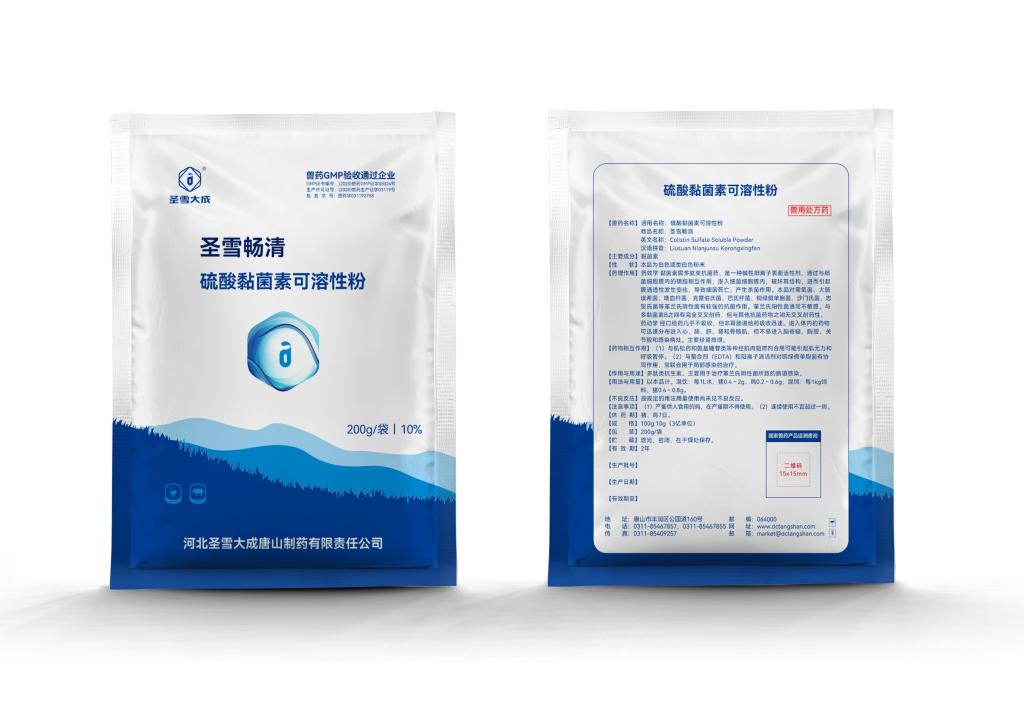
 CONTACT
CONTACT
- Linkman:Linda Yao
- Tel: +8618231198596
- Email:linda.yao@dcpharma.cn
- Linkman:CHARLES.WANG
- Department:Overseas
- Tel: 0086 0311-85537378 0086 0311-85539701
Resisting Antibiotic Resistance: Colistin Sulfate Soluble Powder's Role.
TIME:2023-12-26
I. Introduction
Antibiotic resistance poses a significant threat to global public health and agriculture. In the realm of veterinary medicine, Colistin Sulfate Soluble Powder has emerged as a critical tool in the fight against bacterial infections. This article delves into the mechanisms of antibiotic resistance, the role of Colistin Sulfate in mitigating resistance, and the measures necessary to preserve the effectiveness of this essential antimicrobial agent.
II. Understanding Antibiotic Resistance
A. Mechanisms of Resistance
Antibiotic resistance occurs when bacteria evolve to withstand the effects of antibiotics, rendering these drugs ineffective. The mechanisms include genetic mutations, horizontal gene transfer, and the selection of naturally occurring resistant strains.
B. Consequences of Antibiotic Resistance
The rise of antibiotic-resistant bacteria jeopardizes the effectiveness of treatment options, leading to prolonged illnesses, increased mortality rates, and higher healthcare costs. In the agricultural sector, the spread of resistant bacteria can also impact food safety and security.
III. The Pivotal Role of Colistin Sulfate
A. Mechanisms of Action Against Resistant Strains
Colistin Sulfate's unique mechanism of action targets the bacterial cell membrane, making it effective against Gram-negative bacteria, including those resistant to other antibiotics. This characteristic positions Colistin Sulfate as a crucial agent in managing infections caused by multidrug-resistant pathogens.
B. Last Resort Antibiotic
In human medicine, Colistin is often considered a last resort antibiotic when other options fail. This underscores its significance in treating infections caused by highly resistant bacterial strains.
IV. Applications in Veterinary Medicine
A. Livestock Disease Management
Colistin Sulfate Soluble Powder is extensively used in veterinary medicine to treat bacterial infections in livestock. Its effectiveness against respiratory, enteric, and waterborne infections makes it a valuable asset in maintaining the health and productivity of animal populations.
B. Challenges in Intensive Farming
Intensive farming practices, while necessary for meeting global food demands, create environments conducive to the rapid spread of infections. Colistin Sulfate's role becomes critical in such settings, necessitating careful management to prevent the emergence and spread of resistant strains.
V. Responsible Use and Stewardship
A. Dosage Guidelines
Responsible use of Colistin Sulfate involves adhering to recommended dosage guidelines. Precision medicine approaches that tailor dosages based on factors such as the specific pathogen, animal species, and weight can optimize therapeutic outcomes and reduce the risk of resistance.
B. Avoiding Prophylactic Use
Unnecessary prophylactic use of antibiotics contributes to the development of resistance. Implementing strict guidelines to avoid the prophylactic use of Colistin Sulfate and other antibiotics is crucial in preserving their efficacy.
C. Monitoring and Surveillance
Robust monitoring and surveillance programs on farms are essential for tracking the prevalence of resistant strains. This data-driven approach allows for timely interventions and adjustments in treatment strategies to curb the spread of resistance.
VI. Challenges and Concerns
A. Emergence of Colistin-Resistant Strains
Despite its efficacy, there have been reported cases of bacteria developing resistance to Colistin. The emergence of these resistant strains raises concerns about the potential loss of a critical antibiotic in the veterinary arsenal.
B. Environmental Impact
The environmental impact of Colistin use in agriculture is a growing concern. Runoff from farms can introduce the antibiotic into water systems, contributing to the selective pressure that drives antibiotic resistance in bacteria outside of the farm environment.
C. Global Regulatory Responses
Regulatory bodies worldwide are responding to the threat of antibiotic resistance by implementing stricter guidelines and regulations surrounding the use of antibiotics in agriculture. The challenge lies in achieving a balance that ensures responsible use without compromising animal welfare or food production.
VII. Alternatives and Innovations
A. Research into Novel Antibiotics
Continued research into novel antibiotics that can complement or replace Colistin is imperative. Identifying new agents with unique mechanisms of action can provide additional tools for managing infections while reducing reliance on existing antibiotics.
B. Non-Antibiotic Strategies
Exploring non-antibiotic strategies, such as bacteriophages, probiotics, and immunotherapies, offers promising avenues. These alternatives can help reduce the selective pressure on bacteria and minimize the risk of resistance development.
C. Sustainable Farming Practices
Adopting sustainable farming practices that prioritize animal health and reduce the risk of infections can contribute to decreasing the reliance on antibiotics. Enhanced biosecurity measures, improved living conditions, and proper waste management are integral components of sustainable farming.
VIII. Future Perspectives
A. International Collaboration
Addressing antibiotic resistance requires global collaboration. Countries, researchers, and stakeholders must work together to share knowledge, best practices, and data to develop a unified and effective approach to antibiotic stewardship.
B. Technological Advancements
Leveraging technological advancements, such as diagnostic tools for rapid identification of bacterial strains and precision medicine approaches, can optimize the use of antibiotics. This ensures targeted treatments and minimizes the risk of unnecessary antibiotic use.
IX. Conclusion
Colistin Sulfate Soluble Powder stands as a critical line of defense against antibiotic-resistant bacterial infections in veterinary medicine. Preserving its efficacy demands a multifaceted approach that includes responsible use, regulatory oversight, research into alternatives, and the adoption of sustainable farming practices. As we navigate the complex landscape of antibiotic resistance, the global community must remain vigilant and collaborative to ensure that Colistin Sulfate and other essential antibiotics continue to serve as effective tools in safeguarding both animal and human health.
- Tel:+8618231198596
- Whatsapp:18231198596
- Chat With Skype







